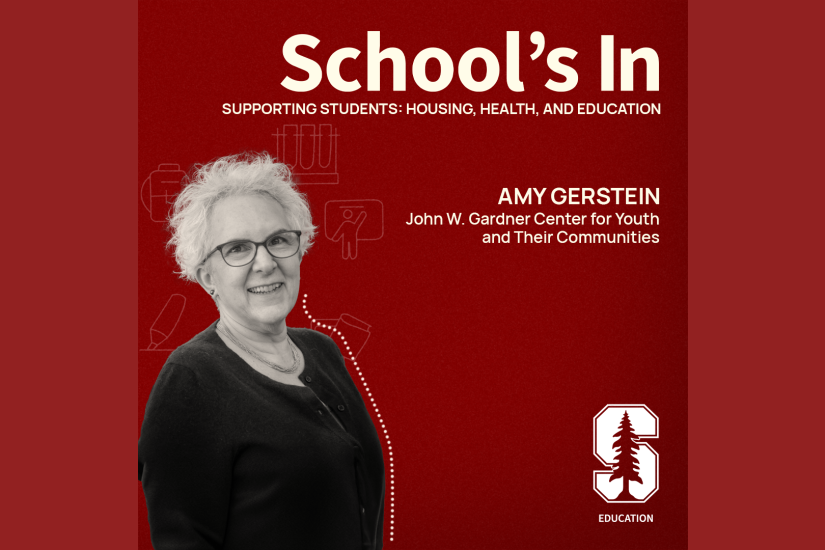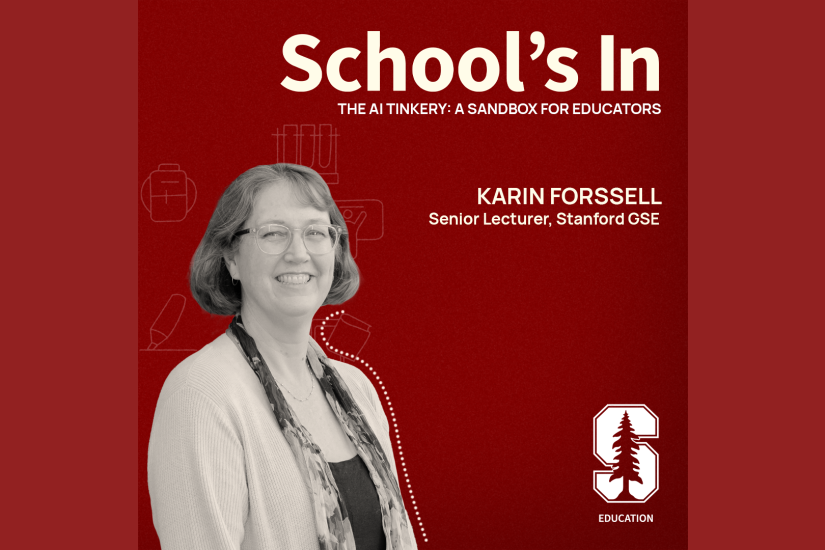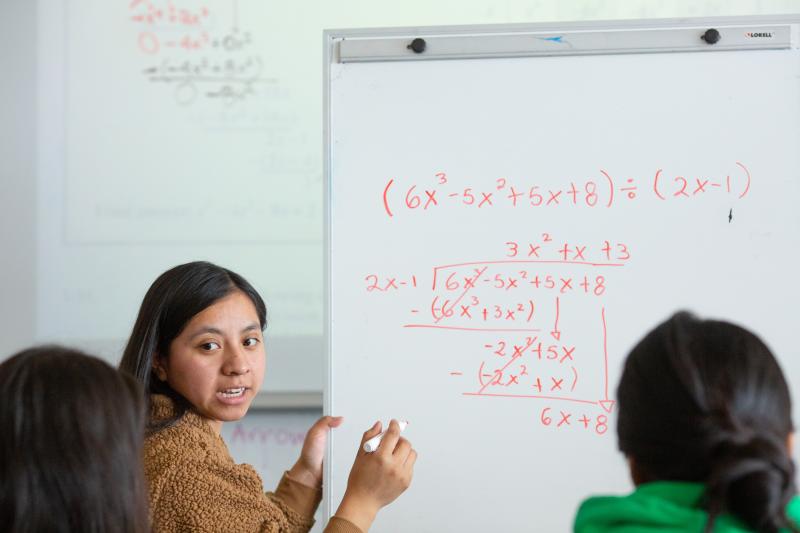
GSE 2024 graduates leave campus to lead lives in service to learning
From bouncing babies and cheerful children, to young adults and centenarians, the full breadth of human life was in attendance at Stanford Graduate School of Education’s (GSE) 2024 commencement ceremony on Sunday, June 16.
The air was electric as GSE students who’ve been on campus from one to five-plus years prepared to receive the fruits of their labor: a degree that will equip them to better education out in the world. Packing most of the seats, though, were the friends, family members, and loved ones that supported students along the way.
“I would like to remind everyone that graduate ceremonies are not really for the students,” said GSE Dean Dan Schwartz before asking graduates to face the audience as part of a longstanding tradition.
“They are for the families and friends of the graduates who are proud of what they have done to help their graduates succeed.”
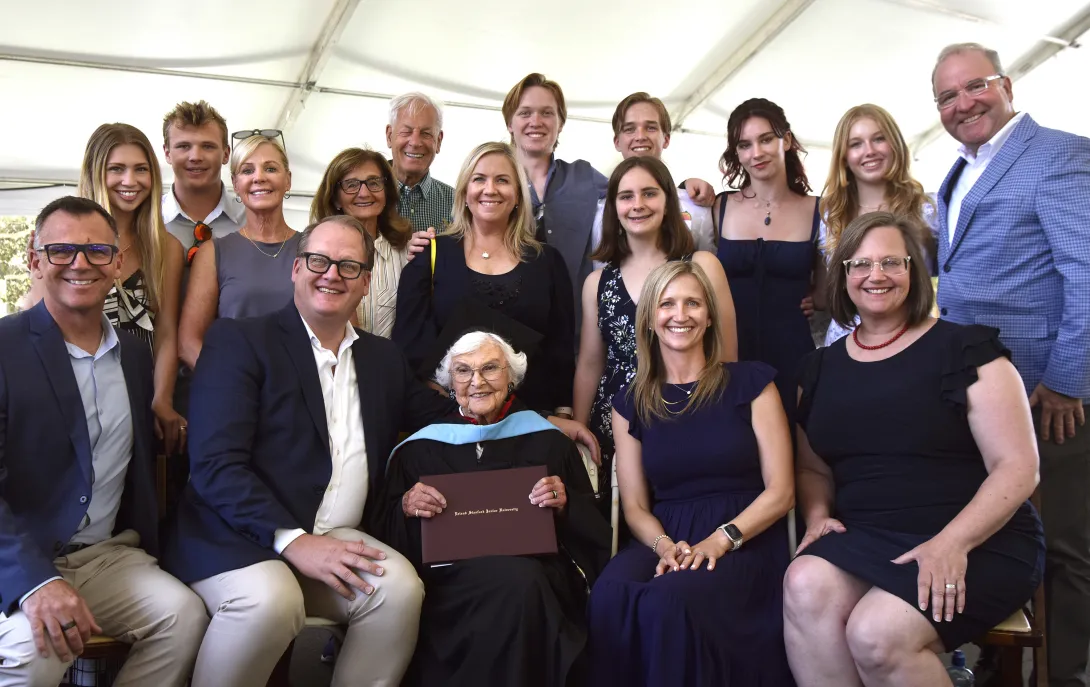
Virginia "Ginger" Hislop (center) holds her long-awaited master’s in education diploma surrounded by 16 family members, including grand- and great-grandchildren. (Photo: Charles Russo)
The arc of a life
Included among the throng of people cheering on their graduates was 16 family members belonging to one Virginia “Ginger” Hislop, a Stanford education student who left campus in 1941 just before turning in her master’s thesis due to her then-boyfriend, now late husband, George, getting summoned to serve in World War II.
“My job as a commencement speaker is to help everyone imagine the arc of life and its possibilities and accomplishments, from the past, to the present moment, and into the future,” Schwartz said in a moving address to students.
“Often this involves a speech with soaring and evocative language to engender your imaginations. This year, I would like to do something different. I will show you the arc of life, and I will try not to cry.”
He went on to share Hislop’s many accomplishments since leaving Stanford 83 years ago, including heading school boards and advocating for students, exemplifying what it looks like to live a life in service of education. Schwartz then conferred Hislop’s long-awaited master of arts in education, just four days after her 105th birthday.
“To me, this degree is an appreciation of the many years I’ve put in working for the schools in the Yakima area and on state boards,” said Hislop, who was born in Palo Alto and resides in Yakima, Washington.
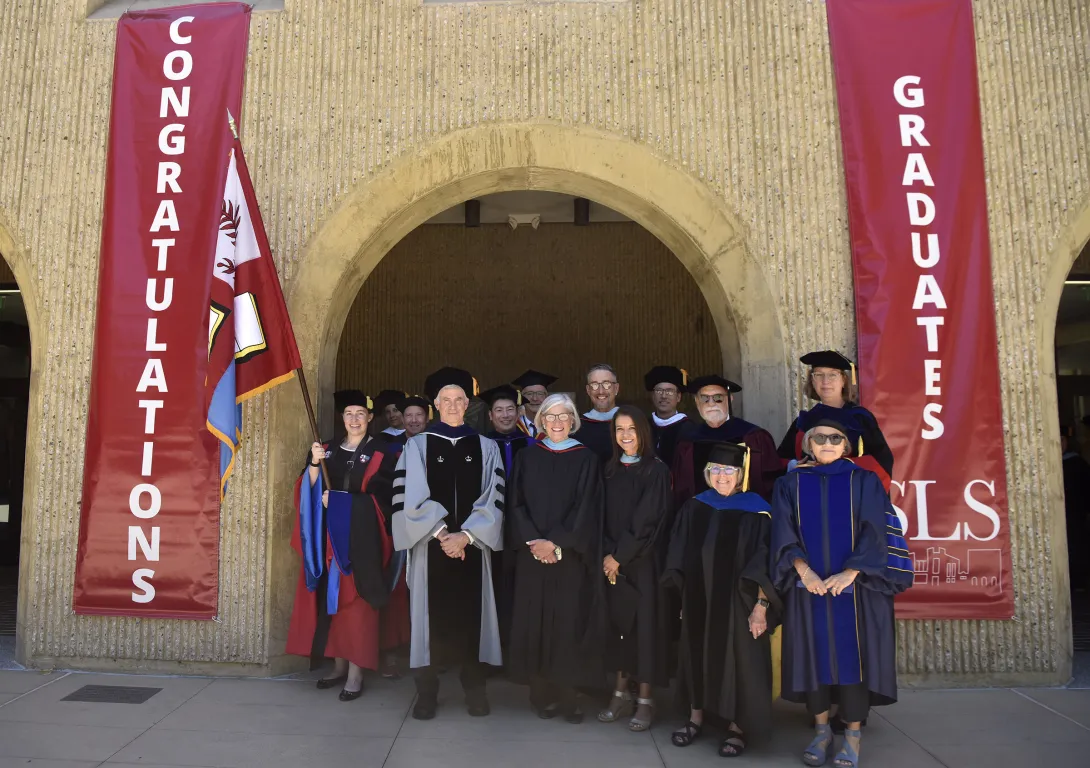
GSE faculty including Dean Dan Schwartz (second from left) and flag bearer Megan Selbach-Allen (far left) prepare to lead the procession at commencement. Upon graduation, Selbach-Allen will work as an education research scientist. (Photo: Charles Russo)
Principles of problem solving in education
Getting to commencement required no shortage of coursework for GSE’s class of 2024 — which this year included 130 master’s, 27 doctoral, 17 joint degree, and 28 undergraduate honors and minors students — so it was only fitting that John Willinsky, Khosla Family Professor Emeritus, structured his speech as a last lecture of sorts.
“It has always been the hope of those sitting on this stage [faculty] that our work will assist in all of the good that you are destined to do in education,” said Willinsky, who taught at Stanford for 15 years before retiring in July of 2022.
His “lecture” had three simple principles for students to follow in order to solve problems in education:
- Find what you can fix in a picture that’s wrong.
- Patiently support those who can help fix the picture.
- Be prepared to iterate and adjust your approach when you encounter unexpected consequences or challenges.
“I’m certain that you graduates – who have already done so much and who hold such promise – are going to improve a great many pictures,” Willinsky said.
For Megan Selbach-Allen PhD ’24, this year’s flag bearer at commencement, the educational picture she’s trying to fix involves the teaching and learning of math for undergraduate students.
“It’s totally fine if someone doesn’t want to start studying a STEM [Science, Technology, Engineering, Math] subject, but if they do start wanting to pursue STEM, and decide against it because they have bad math instruction or classes, that’s a problem that I want to be a part of solving,” said Selbach-Allen, who was a Marine Corps officer prior to joining the GSE in 2018.
After graduation, Selbach-Allen will work as an education research scientist in Harvard University’s math department, where part of her work will be mentoring teaching fellows in education research.
“I’m excited to be a part of teaching the next generation of faculty in mathematics how to teach math based on education research,” she said.
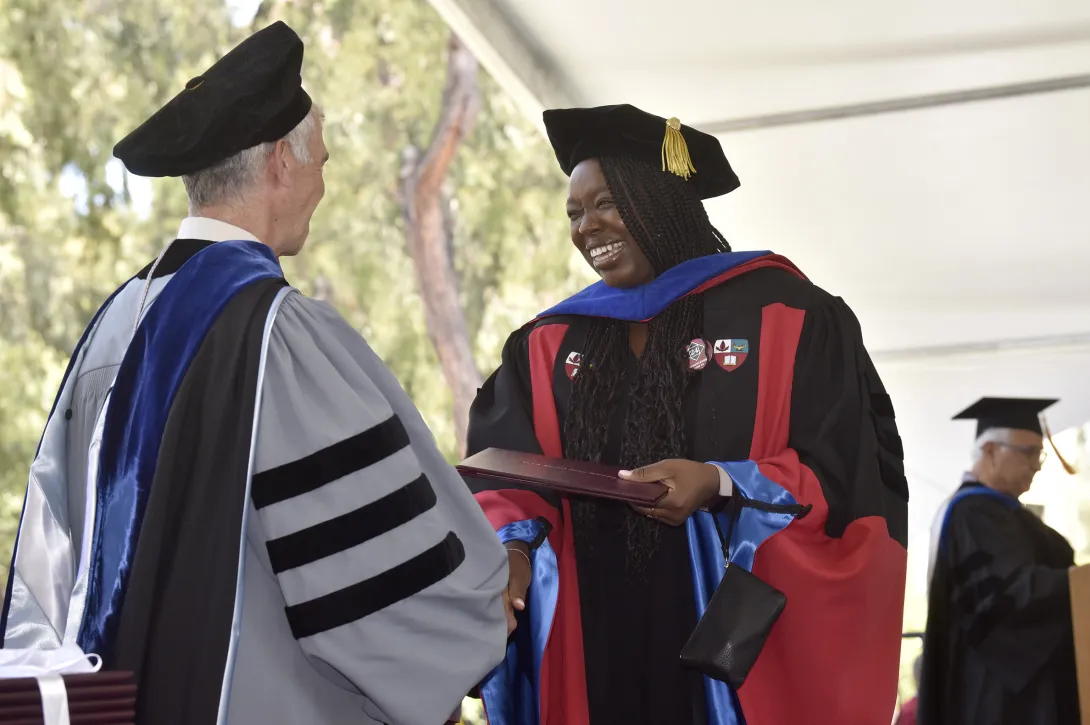
Kemi Oyewole, PhD ’24, accepts her diploma from Dean Dan Schwartz after receiving the Walter J. Gores award for excellence in teaching earlier this month. (Photo: Charles Russo)
Pursuing excellence
Also among the 2024 graduates that received degrees on Sunday was Kemi Oyewole, PhD ’24, who was honored earlier this month with the Walter J. Gores Award, the university’s highest award for excellence in teaching.
“The Gores Award is a humbling recognition of the importance of the university as a place for personal, not only academic, development,” said Oyewole, whose research focuses on what instructional coaching teaches about the needs of contemporary K-12 school systems.
“At its best, teaching asks us to combine our previous experiences with new learning to see the world more expansively,” she said. “I am committed to empowering students to examine who is harmed by unjust social policies and to critically imagine ways people can work together to address these harms.”
Following graduation, Oyewole plans on continuing her research as a provost's postdoctoral fellow at the University of Pennsylvania.
“Commencement was an overwhelming culmination of the love and learning that led me to this milestone,” she said. “My degree is an achievement shared with the family who prayed for me, friends who supported me, and educators whose experiences shaped my dissertation.”
Willinsky closed out his commencement speech by mirroring the way Schwartz opened it: asking students to recognize the community that led them to this auspicious chapter.
“The graduates have been a source of insight, inspiration, and understanding for all of us,” he said.
“Members of the GSE community, by which I mean everyone assembled here, turn to your right and to your left, look forward and turn around, to say thank you to those all around you for helping bring us to this moment. All of us here are a part of it all.”
Faculty mentioned in this article: Dan Schwartz , John Willinsky
